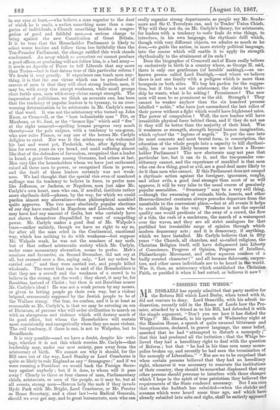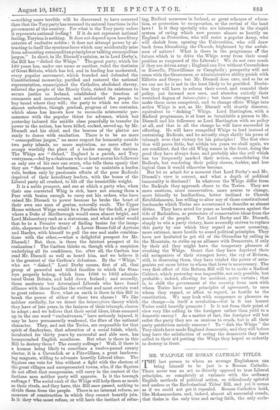" DISHING THE WHIGS."
R. DISR ATILT has openly admitted that party motive for 1/1 the Reform Bill which Lord Derby, when taxed with it, did not venture to deny. Lord Granville, with his adroit in- discretion, recently told in the House of Lords how the Pre- mier, attacked by a friend as to his Bill, had defended it with the simple argument, "Don't you see how it has dished the- Whigs ?' Mr. Disraeli, in his speech of Wednesday night at. the Mansion House, a speech of quite unusual bitterness and bumptiousness, declared, in graver language, the same belief, asserted that he had " attempted to disturb a monopoly that this had produced all the irritation ; that the Whigs be- lieved they had a hereditary right to deal with the question of Reform ; but that " he had in his time seen many mono- polies broken up, and recently he had seen the termination of the monoply of Liberalism." " Nor are we to be surprised that when certain persons believed that they had an hereditary right, whenever it was necessary to renovate the institutions of their country, they should be somewhat displeased that any other persons should presume to interfere with those changes which I hope in the spirit of true patriotism they believed the requirements of the State rendered necessary. But I am sure that when the hubbub has subsided—when the shrieks and screams which were heard some time ago, and which have already subsided into sobs and sighs, shall be entirely appeased
—nothing more terrible will be discovered to have occurred than that the Tory party has resumed its natural functions in the government pf the country. For what is the Tory party unless it represents national feeling ? If it do not represent national feeling, Toryism is nothing. It does not depend upon hereditary coteries of exclusive nobles ; it does not attempt power by at- tracting to itself the spurious force which may accidentally arise from advocating cosmopolitanptinciples or talking cosmopolitan jargon." In short, in Mr. Disraeli's opinion, as in Lord Derby's, the Bill has " dished the Whigs." The great party, which for 180 years has, under one name or another, ruled the destinies of Great Britain, which has led, and in leading has moderated, every popular movement, which founded and defended the Constitutional monarchy, purified and restored the national representation, emancipated the Catholics, abolished slavery, relieved the people of the Bloody Code, risked its existence to secure justice to Ireland, established the freedom of commerce and manufacture, and authorized the people to buy bread where they will ; the party to which we owe the almost unbroken, though gradual, progress of two centuries, which alone has known how to reconcile aristocratic per- manence with the popular thirst for advance, which but yesterday induced the middle class peacefully to transfer its power to the nation, has been killed, cooked, served up, by Mr. Disraeli and his chief, and the bearers of the platter are ready to dance with exultation. There is to be no more " cosmopolitan jargon," no more respect for humanity outside two petty islands, no more aspiration, no more effort to occupy worthily the place of a leader among the nations. The Whig' s are " dished," England is a parish, and Tory vestrymen,—led by a chairman who at heart scorns his followers as only one of his race can scorn, who tells them openly that they are "flat-nosed barbarians,"—are to maintain a leaden rule, broken only by passionate efforts of the poor Radicals deprived of their hereditary leaders, with the bones of the Liberal party all crushed, to lift off the irresistible weight.
It is a noble prospect, and one at which a party who, when their one converted Whig is sick, have not among them a Peer with brains enough to carry out his orders, who have raised Mr. Disraeli to power because he broke the heart of their own one man of genius, naturally exult. The Upper House without Whigs would be a Paradise for the dull, a place where a Duke of Marlborough would seem almost bright, and Lord Malmesbury rank as a statesman, and what a relief would that be to a Premier weary of finding brains for the incap- able, eloquence for the silent 1 A Lower House full of Ayrtons and Hardys, with himself to gull the one and make combina- tions with the other,—what a delightful prospect for Mr. Disraeli But, then, is there the faintest prospect of its realization ? The. Carlton thinks so, though with a suspicion underlying all its confidence, for, after all, the Carlton has read Mr. Disraeli as well as heard him, and we believe it is the greatest of the Carlton's delusions. By the " Whigs," who are " dished," Lord Derby means, first of all, that group of powerful and titled families to which the Stan- leys properly belong, which from 1688 to 1832 adminis- tered Great Britain, and held down Ireland ; and secondly, those moderate but determined Liberals who have found alliance with those families the swiftest and most certain road to great reforms. Now, what on earth is there in this Bill to break the power of either of these two classes ? We like neither cordially, for we detest the laissez-faire theory which they have of late years, in the laziness of their triumph, chosen to adopt ; and we believe that their social ideas, ideas summed up in the one word "exclusiveness," have seriously injured, it may be have permanently weakened, the fibre of the national character. They, and not the Tories, are responsible for that spirit of flunkey's' m, that adoration of a social fetish, which, inculcated for thirty years by successful and able men, has honeycombed English manliness. But what is there in this Bill to destroy them ? The county suffrage ? Well, if there is a human being likely to conciliate a twelve-pound county elector, it is a Cavendish or a Fitzwilliam, a great landown- ing magnate, willing to advocate heartily Liberal ideas. The Squires can vote for him without a fight with the electors of the great villages and unrepresented towns, who, if the Squires do not effect that compromise, will carry in the contest of the factions men neither party will approve. Is it the borough suffrage ? The social rank of the Whigs will help them as much as their rivals, and they have, this Bill once passed, nothing to divide them from- the people. There is no internal reform, no measure of construction in which they cannot heartily join. Is it they who must refuse, or will have the instinct of refus-
ing, Radical measures in Ireland, or great schemes of educa- tion, or protection to co-operation, or the revisal of the land
laws Is it they specially who are interested in the stupid system of rating which now presses almost as heavily on England as Protection, who will resist a popular Army, who will shrink from opening the Universities, who will draw back from liberalizing the Church, frightened by the awful- ness of mitres ? What is there in the programme of the future which is to drive the Whigs away from their usual position as vanguard of the Liberals ? We do not care much if they are driven away ; England can live without Cavendishes or Russells, Fitzwilliams or Campbells ; prosperity will not cease with the Grosvenors, or administrative ability perish with Elliotts and Greys ; but Mr. Disraeli does care, and so far as we can see he is not in the least likely to be gratified. Doubt- less they will have to reform their creed, and remodel their policy, put forward new men, and abandon entirely their wretched dogma of laissez-faire ; but those changes will bat make them more competent, and to change effete Whigs into active Whigs is not, as Mr. Disraeli will shortly discover, equivalent to " dishing " Whigs. Lord Hartington, with a Radical programme, is at least as formidable a person to Mr. Disraeli and his followers as Lord Hartingtou with no policy at all, and that is all the change he will have succeeded in effecting. He will have compelled Whigs to lead instead of restraining Radicals, and he actually sings shrilly his paean of triumph over that victory for his principles ! The first elec- tion will prove little, but within ten years we shall again, we are confident, find the old Whig names in the front, doing the good they have always done, and probably also the evil which has too frequently marked their action, consolidating the Radicals, but rendering their policy slower, feebler, and less- logical than it would otherwise become.
But let us admit for a moment that Lord Derby's and Mr. Disraeli's view is correct, and what a depth of political immorality is disclosed ! In whatever the Whigs differ from. the Radicals they approach closer to the Tories. They are more cautions, more conservative, more averse to change, more friendly to landlordism, better inclined to Church Establishments, less willing to alter any of those constitutional landmarks which Tories are accustomed to describe as almost divine. They have acted for years as breakwaters against the tide of Radicalism, as protectors of conservative ideas from the assaults of the people. Yet Lord Derby and Mr. Disraeli, simply to win a party victory, have avowedly striven to replace this party by one which they regard as more menacing, more extreme, more hostile to sound political principles. They have not hesitated to get rid of the Girondins by calling in the Mountain, to strike up an alliance with Democrats, if only by their aid they might have the temporary pleasure of crushing the Whigs. Grant that they have deprived their old antagonists of their strongest lever, the cry of Reform, still, in disarming them, they have tripled the power of anta- gonists yet more bitter to whom that lever is unnecessary.. The very first effect of this Reform Bill will be to make a Radical Cabinet, which yesterday. was impossible, not only possible, but probable ; indeed, allowing for accident, quite certain ; that is, to shift the government of the country from men with whom Tories have many principles of agreement, to men. whom they regard, or affect to regard, as hostile to the constitution. We may look with composure or pleasure on the change—in itself a revolution—but is it one honest Tories could heartily promote ? Is it not from their point of view very like calling in the foreigner rather than yield to a domestic enemy ? As a matter of fact, the foreigner will but enlist the party they are so anxious to crush, but is all their party patriotism merely rancour ? To " dish the Whigs " the Tory chiefs have made England democratic, and they will before long have the satisfaction of seeing the democrats they have called to their aid putting the Whigs they hoped so ardently to destroy in front.































 Previous page
Previous page